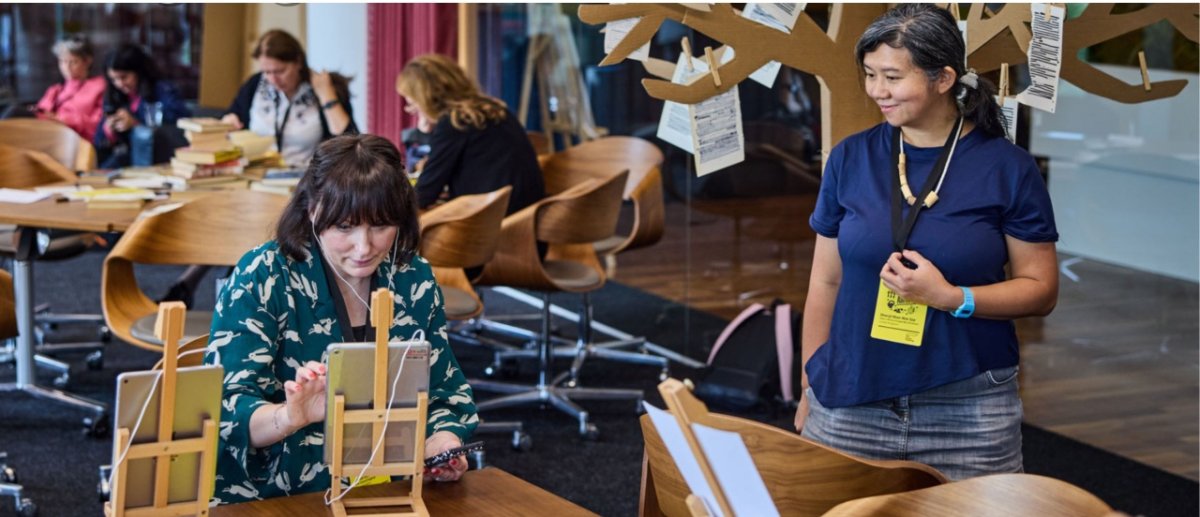“Culture is what allows people to feel part of something bigger... Culture isn’t a luxury—it’s central to
our resilience and self-confidence” says Isabelle Schwarz Head of Public Policy at the European Cultural
Foundation, in an interview with Creatives Unite.
A few days before the consultation deadline for the new European strategic framework for Culture, the
ECF's Head of Public Policy stresses that “Culture Compass can offer a powerful, unifying framework”
and argues that “we need a broader, bolder understanding of culture — not only in terms of heritage and the arts,
but also as a transformative vector that strengthens democracy, security, the climate and the digital
transition”.
On the Creative Europe programme, Isabelle Schwarz states that “it must continue as a
stand-alone programme - grounded in the values of democracy, solidarity and unity - while being scaled up
financially and ideologically” and underlines that “the Creative Europe programme should allow participation
from the entire cultural ecosystem, from the bigger actors with huge European experience to the smaller
players”.
“The 2% for culture call is more than a budget request; it’s a political statement... While others
invest in dividing Europe, we must invest in holding it together—through culture” says Isabelle Schwarz referring to
the Cultural Deal for Europe campaign, an initiative of the European Cultural Foundation in
partnership with Culture Action Europe and Europa Nostra.
Regarding the challenges facing the
cultural and creative ecosystem, the ECF's Head of Public Policy notes that "precarity remains a major issue.
Many cultural workers face unstable conditions and limited access to funding”. She concludes by arguing that
philanthropy cannot and should not replace public funding for culture, but it can be a lever to unleash new funding
sources for Europe.
Creatives Unite (C.U.): Commissioner Micallef launched a process to shape the Culture Compass—a new
framework to guide the future of Europe’s cultural and creative sectors. From your perspective, what strategic
direction should this take?
Isabelle Schwarz (I.S.): The word strategic is crucial here.
Culture must no longer be treated as peripheral or understood in a narrow, conservative way. We need a broader,
bolder understanding of culture—not only in terms of heritage and the arts but as a transformative vector that
strengthens democracy, security, climate, and the digital transition. Culture should be recognised as a compass for
Europe itself, not just for the cultural sector.
This means considering culture as something that binds
us—socially, emotionally, and politically. A true Culture Compass should be visionary, but also actionable.
It should connect values to concrete policies, programmes, and budgets.
C.U.: What role do you believe culture plays in shaping Europe’s
collective identity?
I.S.: At its core, this is about the European sentiment—a sense of
belonging, solidarity, empathy. Culture is what allows people to feel part of something bigger. And that’s essential
in a time when external powers rise and internal divisions threaten cohesion.
But we must also avoid a
Eurocentric lens. Europe must project cultural confidence, yes—but also openness, curiosity, and willingness to
engage with diverse global partners. The framework should be expansive, inclusive, and outward-looking. And it must
link Europe’s internal and external dimensions.

C.U.: How can this framework avoid becoming just another institutional exercise?
I.S.: By
focusing less on structures and more on contents and narratives. We need a compelling story about why culture
matters—not just within institutions, but in the hearts and minds of citizens. Public perception is shaped by the
way we frame culture: it’s not just about leisure or entertainment; it’s about resilience, democracy, and social
cohesion.
And we cannot do this alone. We – meaning EU institutions, philanthropy and civil society - need to
build coalitions of the willing bringing together public bodies, philanthropy and the wider European citizenry. True
progress lies in partnerships that are bold, collaborative, and cross-sectoral.
C.U.: Speaking of
partnerships, what potential do you see for philanthropy in this ecosystem?
I.S.: Enormous
potential. But we need to overcome the legal, administrative and bureaucratic barriers that currently restrict
collaboration. Philanthropy can offer flexibility, experimentation, and long-term vision—things that traditional EU
mechanisms often struggle with.
We’re working, for example, with a group of like-minded foundations on a 1%
for Europe pledge: If every foundation in Europe would dedicate 1% of its annual budget to Europe, this would mean
€550 million per year. Under the working title ShareEurope this initiative would deliver and leverage
European-level projects while being accessible also for local foundations, and later on European citizens who could
also join adding another €550 million. This is an example of collective impact that the EU should not only
encourage, but join.
With the European Investment Bank Group, we’re exploring ideas for pooled funding,
aligned with EU priorities. But for this to flourish, we need EU reform—and above all, trust and shared ambition
between Europeans.
"Philanthropy can offer flexibility, experimentation, and long-term vision—things that traditional EU
mechanisms often struggle with."
C.U.: Could you share a concrete example of how philanthropy might
be integrated into EU cultural initiatives?
I.S.: At the outbreak of the COVID-19 pandemic, we launched
the
Culture of Solidarity Fund—a quick-response mechanism to support cultural actors. We proposed that the EU and
Member States channel funding through this existing mechanism, rather than create fragmented national schemes.
Then
Commissioner Gabriel supported the idea—but legal and political hurdles blocked it. That shows how ready philanthropy
is, but also where the EU must change and adapt.
Imagine a region in Italy working alongside counterparts in
Greece and Finland —each with their own foundations but coming together through pooled or aligned funding. And this
cumulative effect would be matched by EU funding. That’s the kind of European cascade we envision: local energy with
continental impact.
C.U.: Turning to existing programmes, what’s your take on Creative Europe? Has it
served its purpose? Do you think it was effective?
I.S.: Creative Europe has been
effective—but is chronically underfunded and not necessarily accessible to smaller cultural actors, which can
nevertheless have a European ambition.
Creative Europe should allow participation from the entire cultural
ecosystem, from the bigger actors with huge European experience to the smaller players, for example in rural areas. All
can in different ways contribute to making Europe a lived and valued experience, and hence foster a European sentiment
which should be at the core of
Creative Europe.
Europe deserves its own culture programme, as well as
much more strategic investment in culture. Culture is our international hallmark, an extraordinary asset for Europe.
People from all over the world come to Europe to experience culture.
Creative Europe must continue as a
stand-alone programme - grounded in the values of democracy, solidarity, and unity - while being scaled up financially
and ideologically. Separately, culture must be included in other EU policies that are key to our living
together.
"The 2% for culture call is more than a budget request; it’s a political statement."
C.U.: You’ve been
advocating for the Cultural Deal for Europe, including allocating 2% of the EU budget to culture. Can this address
the sector’s challenges?
I.S.: It’s not the full answer—but it’s a vital first step. It’s symbolic
and strategic. In the previous budget, we campaigned to double the
Creative Europe funding—and we nearly
succeeded.
The 2% for culture call is more than a budget request; it’s a political statement. While others invest
in dividing Europe, we must invest in holding it together—through culture. It’s also about unlocking new funding models,
including stronger partnerships with philanthropy.
C.U.: Some may argue Europe currently prioritizes defence and security.
Are you concerned that culture could be sidelined?
I.S.: Absolutely. And it’s already happening. But cutting
culture budgets to fund defence is shortsighted. Culture isn’t a luxury—it’s central to our resilience and
self-confidence. Think of independent media, digital literacy, safe cultural spaces—all crucial in defending
democratic values. This is why culture absolutely needs to be part of the EU’s Democracy Shield.
Culture is a
pillar of non-military security. Undermining it weakens Europe’s soft power, its unity, and its capacity to adapt to
global challenges.

C.U.: If you had to identify the most pressing challenges facing the cultural
sector today, what would they be?
I.S.: Precarity remains a major issue. Many cultural workers
face unstable conditions and limited access to funding.
AI poses another massive challenge—especially around
intellectual property and content creation. Then there's the need for sustainability—both ecological and
institutional. And finally, the skills gap must be addressed. The sector needs investment in education,
adaptability, and new forms of knowledge.
C.U.: Considering Europe’s cultural diversity, can a central
framework like the Culture Compass truly address the needs of all regions?
I.S.: It
must—and it can. But it needs to inspire a cascade effect: a shared understanding of culture, from EU to national to
local levels. This requires alignment, dialogue, and shared strategic priorities, particularly on democracy,
security, and sustainability.
If we stay focused on togetherness, and understand diversity as a strength, the
Culture Compass can offer a powerful, unifying framework.
C.U.: In conclusion, what’s your hope for
the Culture Compass?
I.S.: That it becomes a game-changer. Not a technical policy
document, but a political vision for how we live together. A Europe that understands culture as its heartbeat, its
connective tissue. A Europe that invests in its soul. Because in the end, culture is not just what we
do—it’s who we are.
Images: Courtesy of the European Cultural Foundation










